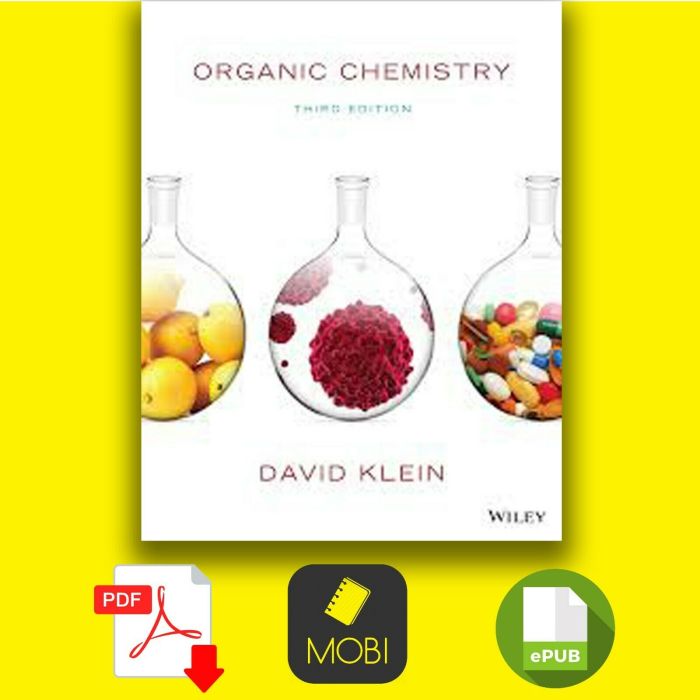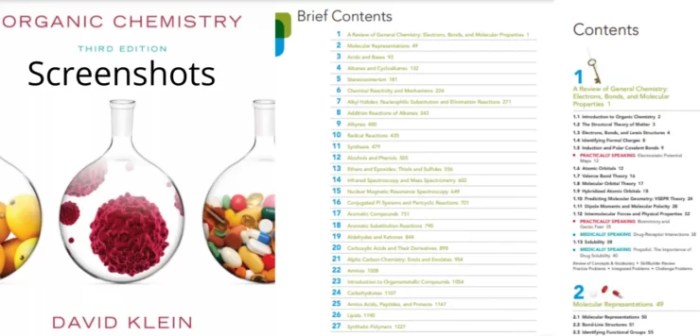Organic Chemistry by David Klein 3rd Edition stands as a testament to the captivating nature of chemistry. This seminal work delves into the intricate world of organic compounds, offering a comprehensive exploration of their structure, reactivity, and applications.
Within its pages, Klein masterfully guides readers through the fundamental principles of organic chemistry, laying a solid foundation for understanding the behavior and properties of these essential molecules.
Overview of Organic Chemistry by David Klein 3rd Edition

Organic Chemistry by David Klein is a comprehensive textbook designed for students pursuing a foundational understanding of organic chemistry. It targets undergraduate students majoring in chemistry, biochemistry, and related disciplines, providing a clear and systematic introduction to the field.
The textbook is organized into 23 chapters, each covering a specific aspect of organic chemistry. The chapters are grouped into six parts, progressing from fundamental concepts to more advanced topics. Klein’s writing style is engaging and accessible, making the complex subject matter approachable for students.
Key Concepts and Theories
Organic Chemistry by David Klein covers a wide range of fundamental concepts and theories, including:
- Bonding and molecular structure
- Stereochemistry
- Reaction mechanisms
- Spectroscopy
These concepts form the foundation of organic chemistry and are essential for understanding the behavior and properties of organic molecules.
Problem-Solving Strategies
The textbook emphasizes the development of problem-solving skills, providing students with a systematic approach to tackling organic chemistry problems. Klein presents various problem-solving strategies, such as:
- Identifying functional groups
- Predicting reaction products
- Drawing reaction mechanisms
- Analyzing spectroscopic data
These strategies enable students to approach problems confidently and develop critical thinking abilities.
Applications and Examples
Organic Chemistry by David Klein showcases the practical applications of organic chemistry in various fields, including:
- Medicine
- Materials science
- Environmental chemistry
The textbook provides real-world examples of how organic chemistry principles are used to develop new drugs, create advanced materials, and address environmental challenges.
Pedagogical Features, Organic chemistry by david klein 3rd edition
Organic Chemistry by David Klein incorporates several pedagogical features to enhance student learning:
- Visual aids:Diagrams, charts, and graphs help students visualize complex concepts.
- Case studies:Real-world examples illustrate the practical applications of organic chemistry.
- Practice problems:Numerous practice problems and exercises provide opportunities for students to test their understanding.
These features contribute to the effectiveness of the textbook as a teaching tool.
Comparison with Other Textbooks
Organic Chemistry by David Klein 3rd Edition compares favorably to other popular organic chemistry textbooks in terms of:
- Content coverage:Comprehensive and up-to-date coverage of fundamental concepts and advanced topics.
- Pedagogical approach:Clear and engaging writing style, with a focus on problem-solving strategies.
- Target audience:Well-suited for undergraduate students majoring in chemistry, biochemistry, and related disciplines.
Essential FAQs
What is the target audience for Organic Chemistry by David Klein 3rd Edition?
Organic Chemistry by David Klein 3rd Edition is primarily intended for undergraduate students pursuing a degree in chemistry or a related field.
What are the key features of Organic Chemistry by David Klein 3rd Edition?
Organic Chemistry by David Klein 3rd Edition is renowned for its clear and concise explanations, engaging examples, and innovative pedagogical features, including visual aids, case studies, and practice problems.
How does Organic Chemistry by David Klein 3rd Edition compare to other textbooks?
Organic Chemistry by David Klein 3rd Edition stands out from other textbooks due to its comprehensive coverage of organic chemistry concepts, its emphasis on problem-solving strategies, and its incorporation of real-world applications.


